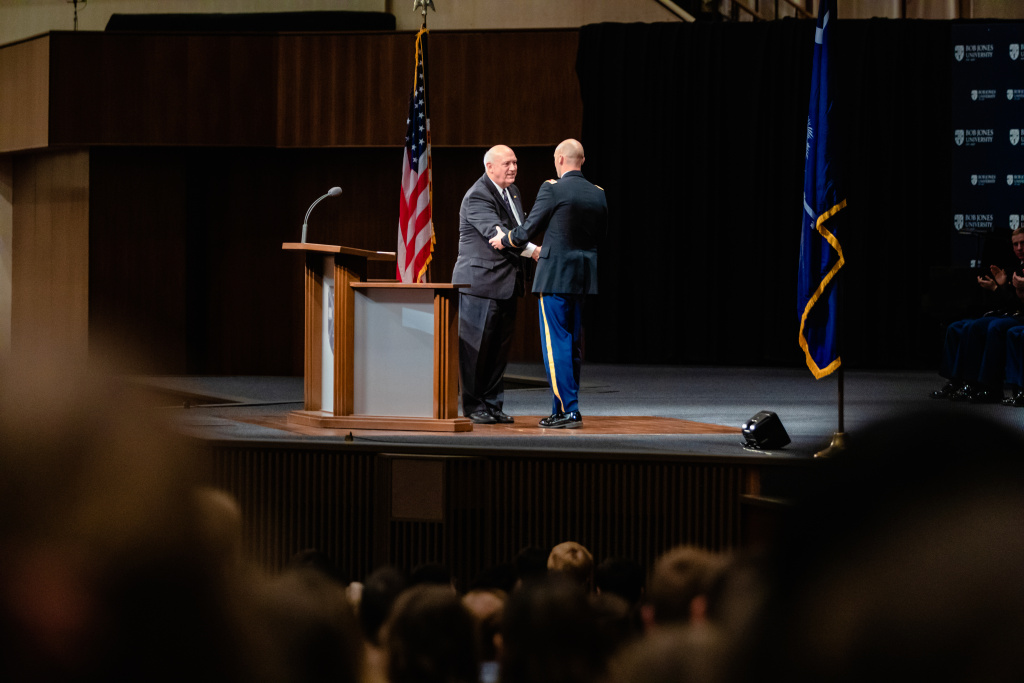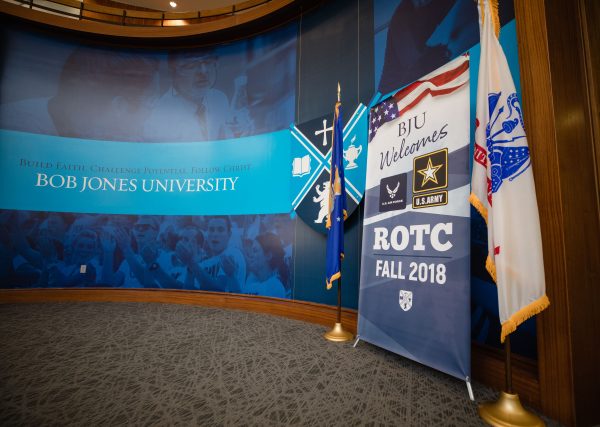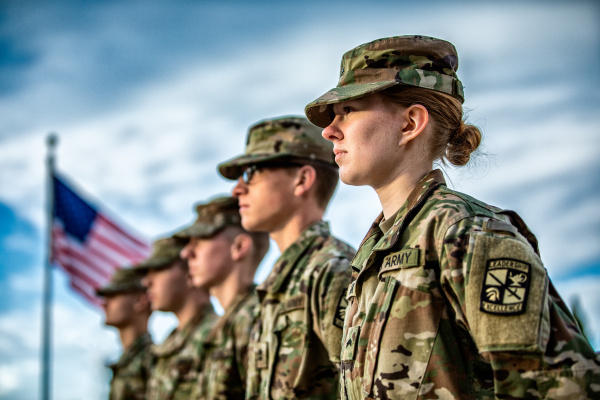“I’m not used to having support like this. People just don’t support the military like you all do (at BJU),” Al Carper recollects U.S. Army Lt. Col. Ryan Forshee saying. Forshee—the colonel over BJU’s ROTC partner program at Furman University—works closely with Carper, BJU’s ROTC Program Coordinator.
About Al Carper
Carper is a faculty member in the management division of BJU’s School of Business. After graduating from BJU with a bachelor of science in business management (now business administration) in 1977, Carper began his career. He worked for a year and a half as a Sales Development Manager for Clark Equipment Company and then for five years as manager of First Citizens Bank in North Carolina. Meanwhile, he pursued a Master of Business Administration degree from the McColl School of Business at Queens University, which he earned in 1984. However, before he completed the degree, the provost of BJU asked Carper to join the BJU faculty at the recommendation of a retiring professor. Carper agreed, replacing his former professor in 1983.
But business is not Carper’s only passion. As the son of a U.S. Navy officer, Carper supports the U.S. military. Carper wrote, “After a competitive selection process, in 1989 (I) received a direct commission into the U.S. Navy Reserve and subsequently graduated from the Navy Supply Corps School in Athens, GA.” While teaching, he had various assignments and positions on weekends and during summers.
Then, in January 2003, Carper was mobilized to active duty under Operation Enduring Freedom. “(I) served as the Commanding Officer for the Navy Mobilization Processing Site … (in) Norfolk, VA. In this role, (my staff and I) processed thousands of mobilizing and demobilizing Navy reservists. (We also) ensured timely and proper medical care for hundreds of wounded and injured Navy personnel before their repatriation.”
When his time of active duty ended in January 2005, Carper returned to BJU, only this time as the Executive Vice President and Chief Operations Officer. In 2011, he transitioned back to teaching business. He also became the Program Coordinator for BJU’s Army and Air Force ROTC programs, which launched in the fall semester of 2018.
See Also: Is BJU’s New ROTC Program Right for You?
Carper Weighs in on Thanking Veterans
As a veteran himself, Carper shared several practical ways to thank veterans for their service.
Thank Them
Directly thanking veterans for their service when you see them literally speaks volumes. “Don’t ignore them,” said Carper. “Often times you can spot the veterans because they have some kind of an indicator,” such as a uniform, vest, pin or cap. You can also thank those who currently serve and those who are going to serve. “We’ve got ROTC cadets all over campus (that we can thank),” Carper pointed out.
Support Organizations and Volunteer
Next, Carper said, “You can … thank veterans by supporting organizations that support veterans.” Groups like the Veterans of Foreign Wars or associations such as the Reserve Officer Association are all great options. “So just check it out in your community,” Carper said. “(When) somebody graduates (and goes) out into a small community, they might want to … see if there is something like the American Legion. Ask, ‘How can I support the American Legion? I’m not a veteran, but what can I do to help?’ They’re always looking for volunteers.”
See Also: BJU-Affiliated Active Duty Military Personnel
You can also volunteer at military hospitals. “They have VA clinics in almost every town,” Carper said. “Just go in and say, ‘Hi, I’d like to volunteer and help. What can I do?’ … (They might) give you some paperwork to do because they never have enough money to hire the people they need.”
Serve Veterans in Your Community
You can support by helping those who have served or families that have a member of the household in the military. Carper said, “Ask, ‘Can I come cut your grass every week?’ or ‘How can I help you?’ (Elderly veterans may) just need some help around the house.”
Tell Their Stories
Another way to honor veterans is by telling their stories. You can read up on veterans online and then share with others what you learn. Among the many stories he has of himself and those he admires, Carper has one story in particular worth mentioning:
(Lewis) “Chesty” Puller was a colonel in the Marine Corps. … He was a bulldog. (He and his men) were going up against an insurgence in the Philippines, and everybody knew if you were going up against the Marines because they had yellow leggings back in those days. And the insurgents, whenever they saw the Marines coming with their yellow leggings, took off. They never wanted to fight (the Marines). So (Puller) ordered all of his Marines to take off their yellow leggings. “I want them to think that we’re in the Army.” And the insurgents always went up against them, and they wiped them all out. That was Chesty Puller—“I want to fight, and I want to kill them all.”
But veterans who do not have their histories published also have stories to tell. And many of them are in your own families. Carper said, “If you have a relative who has served, … spend some time with them over Thanksgiving or Christmas and interview them or write down their story because they might not be around much longer.”
You could even interview veterans from your church or community. “Trust me, everybody in the military has stories that are very interesting and exciting,” Carper said. “(But) a lot of veterans—they just don’t think to tell their stories unless somebody asks them.”
Additionally, you as the interviewer can benefit from learning about veterans. “It gives you a whole new respect for (the military),” he said.
Promote Veterans with Social Media
Social media can be a great way to thank veterans. “There are a lot of veteran causes that could be promoted,” said Carper. “Perhaps promote special anniversaries in the military … and then maybe give a brief synopsis of it.” Carper also suggests recognizing personal heroes or sharing the stories you learn. He mentioned promoting veteran causes as well, especially if you are already involved in them. “If there’s something that’s going on, like they need volunteers at the local VA … put that out on social media,” he said.
Supporting veterans is especially relevant to Christians. Carper said, “One of the things we are brought up to do as Christians, you know, to be supportive of our government and be supportive of our military.” You can make an impact for Christ by serving our nation’s servants.








